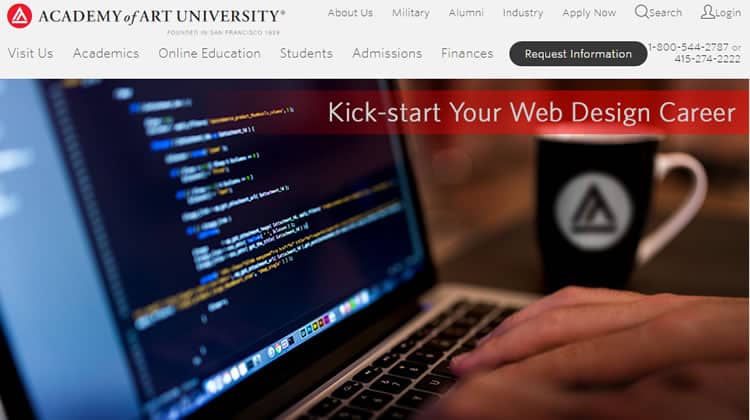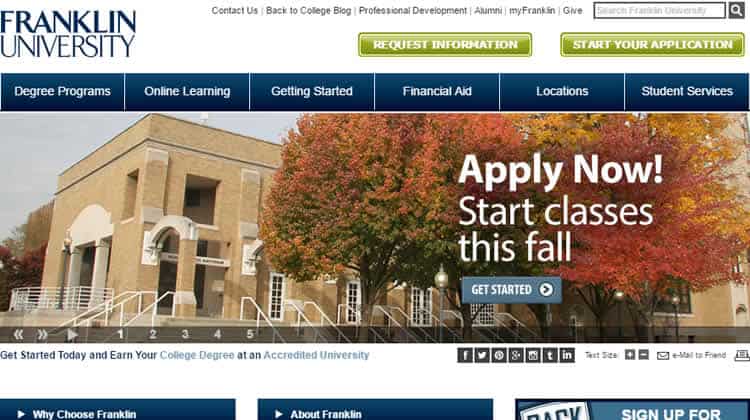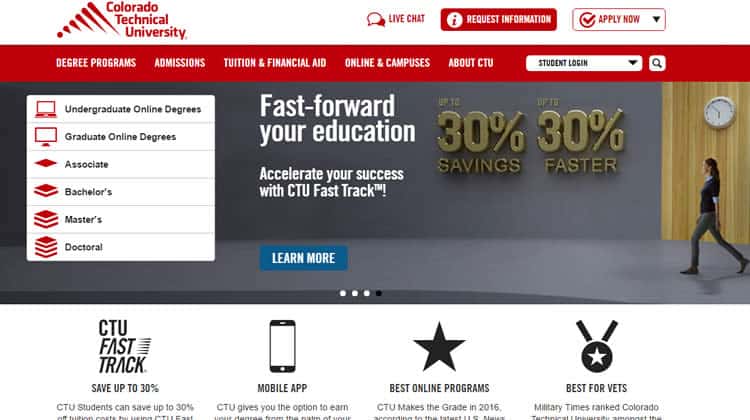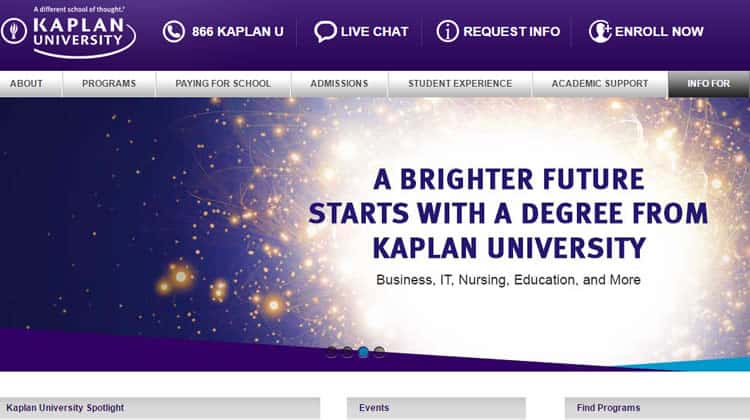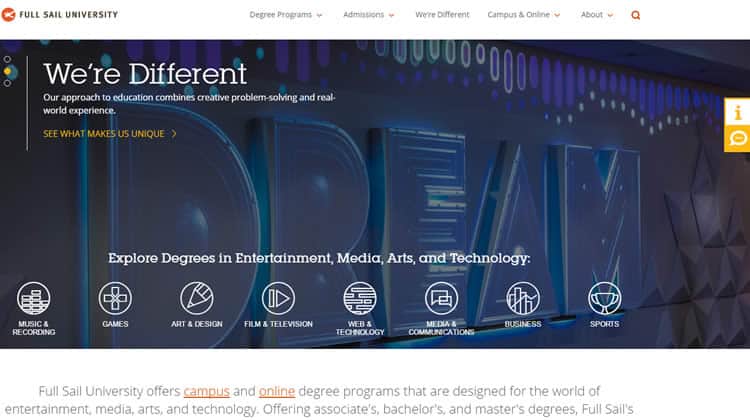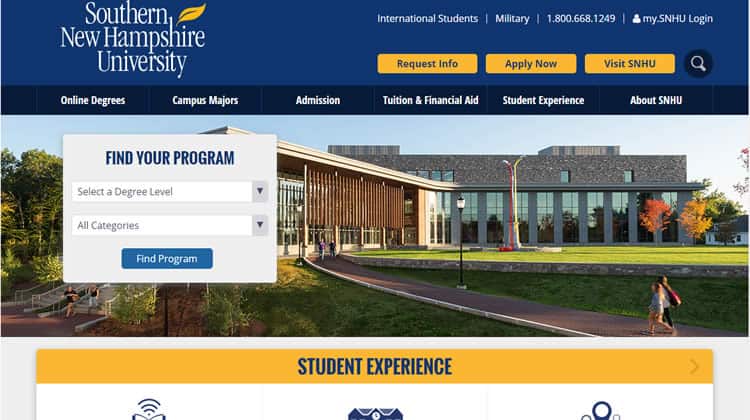
Part artist, part tech wizard, web designers use basic artistic concepts to create beautiful, functional websites and they can code the individual features of a site to perfection. They love technology and innovation and they are always looking for new ways to make their designs more usable.
If any of the previous sentences piqued your interest, you might have the heart of a web designer. If so, consider going to university for web design. A career in this field usually means:
- You will need an Associate or Bachelor’s degree. Associates tend to be accepted for entry-level positions.
- Anticipate classes in technical skills, like coding, but also be ready to take fundamental courses like design or even classic art.
- You are expected to be flexible in your abilities. As a web designer, you will work on a variety of projects. These could include anything from designing a website for kids to designing a professional landing page for a million-dollar enterprise business.
- The job outlook for web designers is very good, and the demand is expected to grow 13% through 2020.
- Salary is highly dependent on skills. Currently, the median base salary in the US is around $46,000, but wages vary widely.
Getting a degree is the first step toward a career in web design. There are literally hundreds of schools and universities offering degrees in web design, so obviously the search can seem daunting. Consider the following ways to evaluate a university program.
How to Evaluate a University Program
When looking for a university program, there are a number of things you should consider first, like where the university is located, how much the program costs and the student-to-teacher ratio. Here are a few steps to get you started:
- Decide if you want to attend classes online, in the classroom, or a hybrid of the two. Some universities are online only, while others may have a physical campus but offer course work online.
- Look at the individual programs the university offers. Some web design degrees will be more tech-focused, while others will lean towards the artistic side. What skills do you have? If you are inherently artistic, you might want to fine-tune your tech skills. If coding is a breeze, consider exploring universities that lean to art.
- Determine how the university is accredited. Accreditation is somewhat complex, and there are several loopholes when it comes to accrediting standards. Unfortunately, some universities take advantage of this. Understand how accreditation works, and then find out how the university you are researching is accredited.
- Look at the costs of the university programs. Some may be prohibitive, which means you can scratch them off your list. Universities are required to show you how much you can expect to pay in total for a program. Then, dig around on their websites to find out if they offer scholarships and other forms of financial aid.
- Finally, read as many student reviews as you can get your hands on. You will learn what the classes are like, how heavy the workload is, what people like and dislike about the university, and more. Student reviews are some of the most valuable information you can get when making your decision.
Universities With the Best Web Design Programs
Now that you know the criteria you should use to examine universities, here are a few prestigious universities with excellent web design programs.
Academy of Art University
With a campus in San Francisco, Academy of Art University offers both on-campus and online degree programs. Keep in mind however, that San Francisco has a notoriously high cost of living.
AAU offers a wealth of degree programs: certificates, Associate’s, Bachelor’s, and Master’s degrees. It is a private art school and the web design program focuses on core design concepts. There is also a focus on the technical side of web design. Attending the Academy of Art University costs roughly $18,840 per year and is regionally accredited by the Senior Colleges and Universities of the Western Association of Schools and Colleges (WASC)
Franklin University
Franklin University is a public, not-for-profit university offering web design programs online and on campus, though 80% of the student body attends virtually.
Each student is paired with his or her own mentor or personal development coach. Those acquiring Bachelor’s degrees have the option to take elective classes, which go toward a Master’s degree. Franklin University costs about $13,640 per year and is accredited by the Higher Learning Commission with additional individual accreditation for certain programs.
Colorado Technical University
Colorado Technical University (CTU) offers a Bachelor’s degree in IT with a web design specialization, online and on campus.
This degree program leans more towards the technical side, hence the name. Students learn 3D technology, mobile web design and new media, among other design concepts using a variety of tools. Attending Colorado Technical University costs an estimated $14,950 per year and the university is accredited by the Higher Learning Commission.
Kaplan University
Kaplan University has a huge variety of degree programs.
Classes are taught either on campus or online. Its advanced web design certificate program requires a degree in IT, which can also be obtained through them. The certificate program is an extension of the IT degree. The average cost of a Kaplan University program is $12,272 per year, and it is accredited through the Higher Learning Commission with additional accreditations per program and state.
Full Sail University
Full Sail is a private, career-oriented university, meaning you will not have to attend core classes like you would at a traditional university.
It offers an online and on-campus Bachelor of Science in Web Design. The courses focus on design concepts and technical skills. It also offers Master’s degree programs in Internet Marketing, Media Design, and other programs. The online Bachelor’s program costs about $13,500 per year. Full Sail University is accredited by the Accrediting Commission of Career Schools and Colleges (ACCSC) and is licensed individually per state.
American Intercontinental University
American Intercontinental University (AIU) is a privately-owned university that has been around since the early 1970s. It offers many Associate, Bachelor and Master degree programs.
Its online program is a Bachelor of Fine Arts with a concentration in web design. Students learn basic design concepts and methods in addition to technical aspects of web design. Attending the American Intercontinental University costs about $20,000 per year and the university is accredited by the Higher Learning Commission.
Southern New Hampshire University
Southern New Hampshire University (SNHU) offers online and on-campus programs for Associate’s, Bachelor’s, or Master’s degrees in IT.
SNHU has received awards and recognition for its degree programs and for its innovation. The IT degree program has a technical focus with scaling artistic concentrations in different aspects of design. Programs at the Southern New Hampshire University cost about $27,234 per year. The university is regionally accredited by the New England Association of Schools and Colleges (NEASC).
Get Out There and Learn!
When looking for a university program, take time and do your research. You are making a huge commitment and a huge investment of time and money, so make sure the university program provides you with what you are looking for.
Shop around and get catalogs from each institution that interests you. The catalogs will show you individual courses within a degree, and these will vary tremendously from one university to another. Make sure you will be getting the education you need to supplement the skills you already have. Above all, keep fueling your passion for web design and never stop learning.
Want to learn more?
Are you interested in the intersection between UX and UI Design? The online courses on UI Design Patterns for Successful Software and Design Thinking: The Beginner’s Guide can teach you skills you need. If you take a course, you will earn an industry-recognized course certificate to advance your career. On the other hand, if you want to brush up on the basics of UX and Usability, try the online course on User Experience (or another design topic). Good luck on your learning journey!
(Lead image: Depositphotos)

